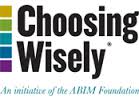 by NaRCAD Staff Tags: Materials Development Mr. Wolfson is Executive Vice President and COO of the ABIM Foundation, a non-profit foundation focused on advancing medical professionalism and physician leadership to improve the health care system. Mr. Wolfson has been instrumental in leading the Choosing Wisely® campaign (www.choosingwisely.org), a multi-year effort engaging nearly 45 medical specialty societies to promote conversations between physicians and patients about utilizing the most appropriate tests and treatments and avoiding care that may be unnecessary and could cause harm. NaRCAD: Why did ABIM Foundation initiate Choosing Wisely®? Wolfson: The mission of the ABIM Foundation is to advance medical professionalism to improve health care. One of the ways we do this is through a small grant program called Putting the Charter into Practice. The National Physicans Alliance received one of these grants and used it to create the Good Stewardship Project, through which “Top 5” lists of overused tests and procedures were identified in internal medicine, family medicine and pediatrics. It was around the same time that Howard Brody called on specialty societies to create their own “Top 5” lists in the New England Journal of Medicine. We recognized this as an opportunity to tap in to physicians’ intrinsic motivation to care for their patients, as well as the alignment with the ideals of the Physician Charter. From there the Choosing Wisely® campaign was born. I think it’s one of the greatest examples of professionalism in action. NaRCAD: What are the primary goals of the Choosing Wisely® campaign? Wolfson: The goal of Choosing Wisely® has always been to encourage clinicians and patients to engage in conversations aimed at avoiding wasteful or overused tests, treatments or procedures. We do this by educating clinicians through lists created by specialty societies, and patient-friendly materials developed by Consumer Reports. There are many groups advancing the campaign throughout the country, including more than 20 grantees thanks to support from the Robert Wood Johnson Foundation. NaRCAD: What have been the biggest challenges to developing recommendations? Wolfson: In some ways one of the biggest challenges has been the sheer number of recommendations the campaign has generated. Oftentimes societies will survey their members for potential items to include on their list, resulting in far more recommendations than could feasibly be addressed. Culling these recommendations down to a manageable number is no small task for the societies; however it’s incredibly important so that we can focus efforts on reducing overuse in areas with the greatest potential to improve care. NaRCAD: Who is the audience for the recommendations – clinicians, patients, policy makers, or other groups? Wolfson: We think there are multiple audiences for the Choosing Wisely®recommendations, but the two primary audiences are clinicians and their patients. Each of the societies has created lists of tests, treatments and procedures in their own specialty they say are overused and should be questioned. This is important information for the clinician—but conversations are a two way street. That’s why the work of Consumer Reports is so important in translating complex medical information into materials patients can understand. Now clinicians and patients can engage in informed conversations based on sound evidence and science about what care is truly needed. NaRCAD: How is the ABIM Foundation disseminating the Choosing Wisely® messages? What role do you see for techniques such as academic detailing in that process? Wolfson: The ABIM Foundation works with the specialty societies to help disseminate messages about Choosing Wisely® to their members. This can take many forms, such as newsletter articles, videos, journals and at conferences. We’ve found Choosing Wisely® messages have really resonated through social media as well and inspired others to tweet and blog on the campaign regularly. The campaign has also reached consumer audiences through the work of Consumer Reports and a coalition of partners that includes AARP. And we’ve been pleasantly surprised by the coverage by mainstream media in outlets such as the New York Times, NPR, Vogue, Men’s Health, and all the major television networks. I think there’s an important role for academic detailing in advancing Choosing Wisely®. We know when information comes from a trusted source—such as a specialty society or colleague—that there’s a greater likelihood of behavior change. NaRCAD: In 5 years, how do you think Choosing Wisely® recommendations will have changed clinical care? Wolfson: Five years from now I hope the question “Are you Choosing Wisely?” becomes shorthand for clinicians in settings all across the country whenever they see areas of waste or overuse. I believe Choosing Wisely® will continue to inspire not just conversations between clinicians and patients, but also new projects that will formalize and put a structure around efforts to reduce waste and overuse. I’m very optimistic about our future. Bio: Daniel B.Wolfson, MHSA, is Executive Vice President and COO of the ABIM Foundation. Previously, Mr. Wolfson served for nearly two decades as the founding president and CEO of the Alliance of Community Health Plans (formerly The HMO Group), the nation’s leading association of not-for-profit and provider-sponsored health plans. During his tenure, Mr. Wolfson earned national recognition for spearheading the development of the Health Plan Employer Data and Information Set (HEDIS™), convening the RxHealthValue coalition to provide independent information on the pharmaceutical industry, and co-sponsoring with the American College of Physicians the journal Effective Clinical Practice. Previously, Mr. Wolfson was the Director of Planning and Research at the Fallon Community Health Plan. During that time, he led the product development team that launched the nation’s first Medicare risk contract with the Health Care Financing Administration. Mr. Wolfson received his master’s degree in Health Services Administration from the University of Michigan, School of Public Health. Learn more about Choosing Wisely.
0 Comments
Leave a Reply. |
Highlighting Best PracticesWe highlight what's working in clinical education through interviews, features, event recaps, and guest blogs, offering clinical educators the chance to share successes and lessons learned from around the country & beyond. Search Archives
|
